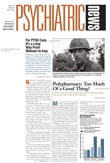Mental health advocates in Washington state are vowing to resurrect a mental health parity bill that successfully passed through the House of Representatives there only to languish in a Senate committee without a hearing before the legislature adjourned in March.
Psychiatrist Christos Dagadakis, M.D., told Psychiatric News that the bill (substitute bill 1828) had the support of the Washington State Psychiatric Association and a coalition of 115 other organizations in the state, including law enforcement and child and family service organizations.
The legislation, which did not make it out of the Washington Senate Ways and Means Committee, would have required that health plans regulated by the state insurance commissioner, as well as plans covering public employees, provide mental health services at the same level as they do other health services. The legislation would not have applied to Medicaid, the individual insurance market, or businesses with fewer than 50 employees.
According to the coalition’s Web site, the bill called for parity to be phased in over five years. It would have covered medically necessary services to treat diagnoses in DSM, with the following exceptions: substance-related disorders; V code disorders; sexual dysfunction disorders; court-ordered treatment unless medically necessary; and residential treatment, custodial care, skilled nursing care, and home health care.
Further, the bill required the same copayments for mental health services as required for other health services, as well as the same deductibles, maximum out-of-pocket requirements, and annual and lifetime dollar limits. Limits on days and number of visits were prohibited, unless they applied to other health services.
One of the bill’s sponsors was Rep. Shay Schual-Berke, a retired cardiologist. “Mental illness is the leading cause of hospitalization for children between the ages of 5 and 19 in Washington, and suicide is the second-leading cause of death among Washington’s adolescents,” said Schual-Berke, the only medical doctor currently serving in the Washington House of Representatives.
Dagadakis said opposition to the bill has come primarily from the small business community, which is fiercely opposed to mandated benefits of all kinds in spite of the bill’s exemption of businesses with fewer than 50 employees. But he said politics in the state extraneous to the parity legislation also contrived to keep it from reaching the Senate floor.
Dagadakis said that the Washington Coalition for Insurance Parity has viewed the parity bill as a multiyear project. An actuarial analysis by PriceWaterhouseCoopers in January 2003 found that the legislation would have increased health insurance premiums in the state by less than 1 percent.
Dagadakis expressed optimism about the bill’s chances in the next legislature.
“We have done a lot of educating of the community,” he said. “We basically neutralized the cost issue while increasing the knowledge base in the community and working with as large a coalition as possible. That will make it successful.”
“The Business Case for Mental Health Parity,” by Gregory Simon, M.D., M.P.H., staff psychiatrist and scientific investigator for the Group Health Cooperative of Puget Sound, is posted online at the coalition’s Web site at www.paritywa.org. ▪
